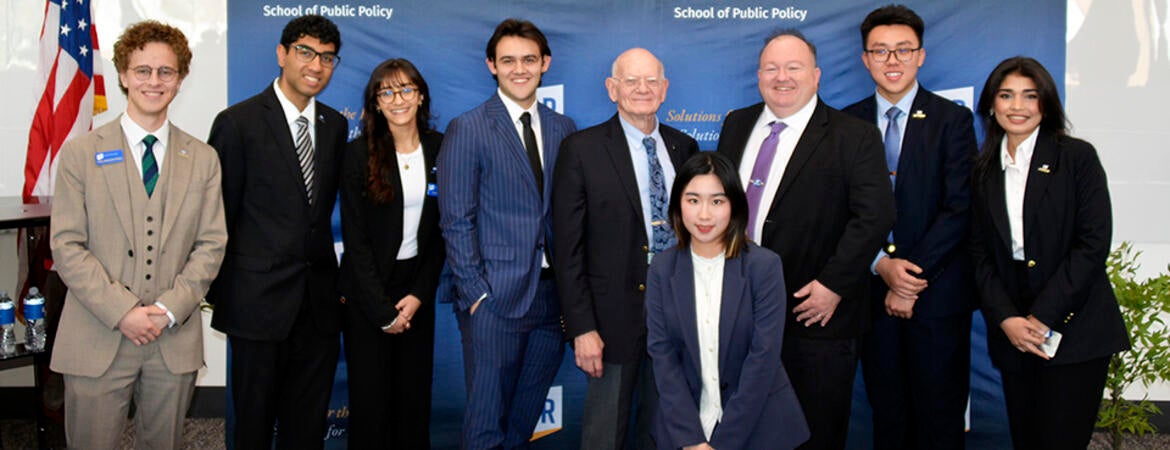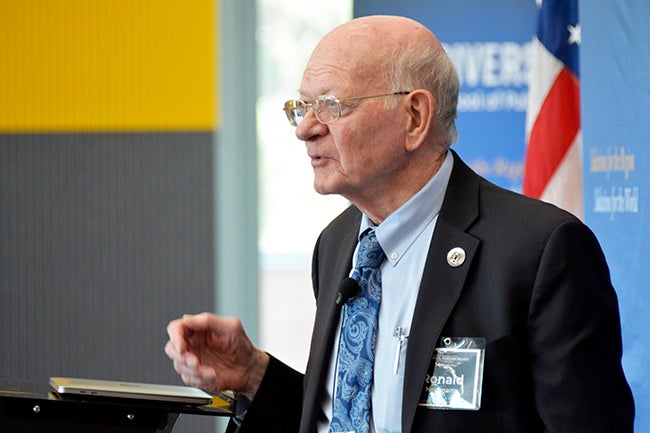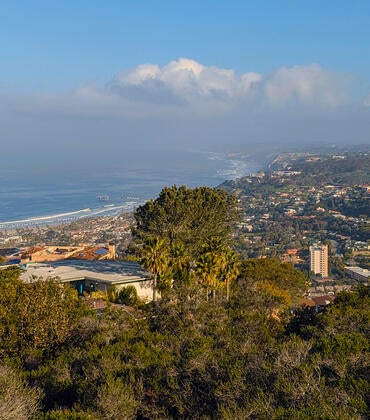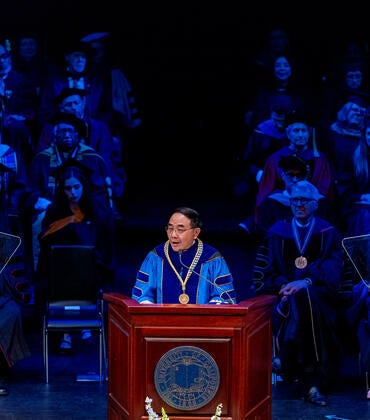
For one whirlwind week in Washington, D.C., a select group of 18 UC Riverside public policy students found themselves in the thick of global affairs—learning firsthand how the gears of diplomacy turn in the nation’s capital.
This opportunity came through the launch this academic year of the Robert Heath Global Policy Scholars Program, a collaboration between UC Riverside and the American Academy of Diplomacy, which is led by UCR alumnus and former U.S. ambassador Ronald Neumann.

The immersive program aims to ignite students’ interest in international affairs by introducing them to the people who have shaped world events from within the corridors of power.
The first group of UCR students attended in December, and a second group will be attending in September. The program benefits from Neumann’s vast experience and network.
Neumann, the president of the diplomacy academy, earned a Bachelor of Arts and a master’s degree from UCR in 1966 and 1967, respectively. He then served in the U.S. Army in Vietnam before joining the U.S. Foreign Service, where he was assigned to work in Senegal, Iran, the United Arab Emirates, and Yemen, among other locations.
Neumann went on to serve as the U.S. ambassador to Algeria during the Clinton administration. The George W. Bush administration later tapped him to be the ambassador to Bahrain and Afghanistan during times of U.S. military conflict with Al-Qaida and the Taliban.
UCR students in the diplomacy program attend a packed schedule of presentations—three per day over five days—each one led by seasoned experts who have lived the policies they’re now discussing. They engage directly with former diplomats in small-group settings to discuss nuclear disarmament, Middle East peace efforts, and the shifting dynamics in Asia and Europe.
“It’s kind of like speed dating for diplomacy,” Neumann said after giving a recent guest lecture at UCR about U.S. foreign policy challenges.
Every one of those speakers, Neumann said, could easily have taught an entire university course on their own. For instance, the students met Tom Countryman, former assistant secretary of state for international security and nonproliferation, who had once negotiated arms control agreements with Russian officials. Others included Molly Williamson, a veteran of multiple cabinet-level departments and a former U.S. consul general in Jerusalem, who provided insider insight into Middle East diplomacy and U.S.-Palestinian-Israeli relations.
“What sets this program apart is that students aren't hearing theoretical analyses,” Neumann said. “They’re hearing from people who’ve sat across from adversaries, who’ve made the tough calls in real time. It’s a whole different level of education.”
Mark Long, the dean of the School of Public Policy, said the program builds on the classwork done on the Riverside campus.
“Our curriculum gives students a really good foundation in understanding public policy,” Long said. “However, it is useful to have direct exposure from practitioners in the field.”
The program was made possible by a $425,000 gift from Robert Heath, a longtime supporter of UCR’s School of Public Policy, which was matched for a total of $850,000 and ensures the program’s longevity for at least 15 years. Just as important, these donations guarantee that financial barriers won’t stand in the way for participating students.
Heath, also a UCR alumnus, had a distinguished career with the United States Information Agency, serving in what’s now the Democratic Republic of the Congo, Ukraine, and Pakistan, among several other countries.
“Thanks to Robert Heath, students who never thought they’d set foot in Washington are now sitting down with diplomats and exploring careers they never considered possible,” said Elliot Emmer, senior director of development for UCR’s School of Public Policy.
The UCR diplomacy sessions are held at the American Academy of Diplomacy offices, and the students stay at the University of California Washington Center, or UCDC, a hub for UC students in D.C. The program complements UCDC’s quarter-long internship program in the capital for juniors, seniors, and some graduate students from UC campuses. UCR students, however, need to apply separately if they want to attend the UCDC quarter-long program.
Neumann sees the partnership with UCR as part of the diplomacy academy’s broader mission to promote understanding and respect for diplomacy for better international relations. With under 400 members—most of them retired high-ranking diplomats—it’s a tight circle with an unmatched depth of experience.
“Diplomacy can look messy from the outside,” Neumann acknowledged. “But when students get this kind of up-close look, they start to understand the nuance, the trade-offs, and the moral clarity that’s required to do it well.”
Neumann emphasized the importance of not letting current political divisions or disillusionment deter young people from pursuing public service.
“If this is the work you want to do, you go after it,” he said. “By the time you’re really active in the field, the whole political environment may have shifted anyway. What matters is the long arc.”



